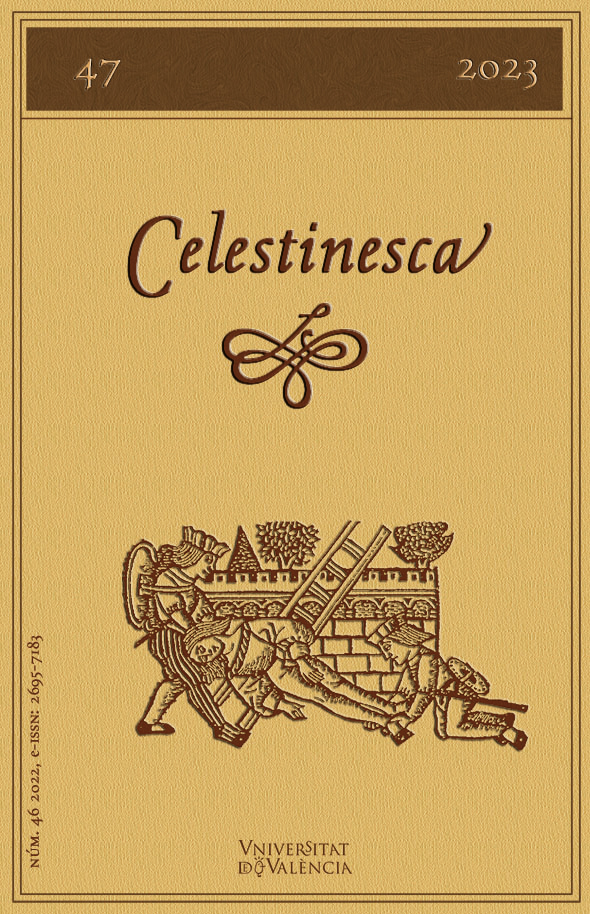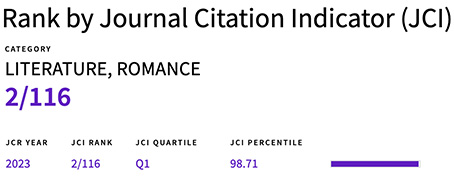Melibea and becoming a subject: questions and ambiguities surrounding will and consent in La Celestina
DOI:
https://doi.org/10.7203/Celestinesca.47.27049Keywords:
La Celestina, feminisms, subject, object, agency, consent, freedom, desire Abstract
Abstract
This paper proposes a reading of La Celestina and, more precisely, of the character of Melibea in the light of a series of categories that nourish the most current systems of thought: contemporary feminist thought, contemporary philosophies (in particular philosophies of desire), and legal debates (some of them very recent) around the questions of discernment and consent. This apprehension of the Celestinesque text through the most contemporary systems of thought will lead us to analyse (and question) the categories of object and subject, the "becoming subject", as well as the notions of will, agency, freedom of choice and consent. Such a reading will lead us to question certain readings that see in Rojas's play a pre-feminist work, a hymn to freedom or the dramatization of a progressive feminine "liberation", in which Melibea passes from the category of object to that of subject.
 Downloads
Downloads
 References
References
Begorre-Bret, Cyrille (2011), Le désir. De Platon à Sartre, Paris, Eyrolles.
Bordeaux, Michèle; Bernard Hazo et Soizic Lorvellec (1990), Qualifié viol, Paris, Méridiens-Klincksieck.
Bourdieu, Pierre (1998), La domination masculine, Paris, Seuil.
Botta, Patrizia (1994), "La magia en La Celestina", Dicenda: Estudios de lengua y literatura españolas, 12, pp. 37-69. https://revistas.ucm.es/index.php/DICE/article/view/DICE9494110037A [accedido el 10/11/2023]
Campbell, Sue; Letitia Meynell et Susan Sherwin (2009), Embodiment and Agency, University Park, Pennsylvania State University Press.
Cátedra, Pedro Manuel (1989), Amor y pedagogía en la Edad Media: estudios de doctrina amorosa y práctica literaria, Salamanca: Universidad de Salamanca, 1989.
Ciavolella, Massimo (1976), La “malattia d'amore” dall'Antichità al Medioevo, Rome, Bulzoni.
Deyermond, Alan, 1977, "Hilado-cordón-cadena: Symbolic Equivalence in La Celestina", Celestinesca, 1/1, pp. 6-12. https://doi.org/10.7203/Celestinesca.1.19447
Disch, Lisa Jane, et M. E. Hawkesworth (ed.) (2015), The Oxford Handbook of Feminist Theory, New York, Oxford University Press.
Epictète (1962), Entretiens, dans Emile Bréhier (trad.) et Pierre-Maxime Schuhl (dir), Les Stoïciens, Paris, Gallimard.
Fraisse, Geneviève (2005), "Le devenir sujet et la permanence de l’objet", Nouvelles Questions Féministes, 24, pp. 14- 23. https://doi.org/10.3917/nqf.241.0014
Gari Lacruz, Ángel (1991), Brujería e Inquisición en el Alto Aragón en la primera mitad del siglo XVII¸ Zaragoza, Diputación General de Aragón.
Godelier, Maurice (1978), "Pouvoir et langage. Réflexions sur les paradigmes et les paradoxes de la 'légitimité' des rapports de domination et d’oppression", Communications, 28, pp. 21-29. https://doi.org/10.3406/comm.1978.1417
Gordonio, Bernardo de (1495), Lilio de medicina, trad. castillane anonyme, Séville, Meinardo Ungut et Estanislao Polono.
Hirata, Hélène; Françoise Laborie, Hélène Le Doaré et Danièle Senotier (2004), Dictionnaire critique du féminisme, seconde édition augmentée, Paris, PUF.
Herrero, Javier (1984), "Celestina’s craft : the Devil in the Skein", Bulletin o Hispanic studies, 6, pp. 343-351. https://doi.org/10.1080/1475382842000361343
Iglesias, Yolanda (2010), "Rompiendo las cadenas: el libre albedrío en los personajes de La Celestina", Celestinesca, 34, pp. 57-73. https://doi.org/10.7203/Celestinesca.34.20124
Lasserre Dempure, Odile (2012), "Écrire le personnage, dire l’humain : La Celestina (1499-1502) de rupture en rupture jusqu’aux confins de la modernité", Babel, 26, pp. 17-44. https://doi.org/10.4000/babel.2549
Le Magueresse, Catherine (2012), "Viol et consentement en droit pénal français. Réflexions à partir du droit pénal canadien", Archives de politique criminelle, 34, pp. 223-240. https://doi.org/10.3917/apc.034.0223
López-Ríos Moreno, Santiago (2001), "La Celestina y los asedios de la crítica", Estudios sobre "La Celestina", Santiago López-Ríos Moreno (éd.), Madrid, Istmo, pp. 9-38.
McNay, Lois (2000), Gender and Agency: Reconfiguring the Subject in Feminist and Social Theory, Cambridge, Polity Press.
Montaner, Alberto, et Eva Lara (2016), "La hechicería en La Celestina desde el estudio de la magia", dans Emilio Blanco (éd.), Grandes y pequeños de la literatura medieval y renacentista, Salamanca, SEMYR, pp. 433-482.
Platon (1993), Gorgias, Monique Canto-Sperber, (trad.), Paris, Garnier Flammarion.
Rico, Francisco (1975), "Brujería y literatura", dans Brujología (Actas del Congreso de San Sebastián, 21-23 septiembre 1972), Madrid, Seminarios y Ediciones, pp. 97-117.
Rojas, Fernando de (2016), La Celestina, Dorothy S. Severin (éd.), Madrid, Cátedra.
Rousseau, Jean Jacques (1965), Discours sur l’origine et les fondements de l’inégalité parmi les hommes, Paris, Gallimard.
Russell, Peter E. (1963), "La magia como tema integral de la Tragicomedia de Calisto y Melibea", dans Studia Philologica. Homenaje a Dámaso Alonso, Madrid, Gredos, pp. 337-354. Réédité dans Russell, Peter E. (1978), Temas de "La Celestina" y otros estudios, Barcelona, Ariel, pp. 243-276.
Sartre, Jean-Paul (1945), L’être et le néant, Paris, Gallimard.
Sartre, Jean-Paul (1976), L’existentialisme est un humaniste [1946], Paris, Éditions Nagel.
Severin, Dorothy S. (1993), "Celestina and the Magical Empowerment of Women", Celestinesca, 17/2: Studies for Peter E. Russell on his 80th Birthday, Julian Weiss (éd.), pp. 9-28. https://doi.org/10.7203/Celestinesca.17.19832
Sisto, David T. (1959), "The String in the Conjurations of La Celestina and Doña Bárbara", Romance Notes, 1/1, pp. 50-52.
Stadthagen Gómez, Helga (2013), "Elementos de brujería en La Celestina", Journal of the Institute of Iberoamerican Studies, 15/2, pp. 175-189.
Simonin, Michel (1985), "Aegritudo amoris et res literaria à la Renaissance. Réflexions préliminaires", dans Jean Céard (éd.) La folie et le corps, Paris, Presses de l'École Normale Supérieure, pp. 83-109.
Tausier Carlés, María (2004), Ponzoña en los ojos: brujería y superstición en Aragón en el siglo XVI, Madrid, Turner.
Vilanova, Arnau de (1985), Arnaldi de Villanova, Opera medica omnia, Michael R. McVaugh (éd.), Barcelona, Universidad de Barcelona.
Wack, Mary Frances (1990), Lovesickness in the Middle Ages. The Viaticum and its Commentaries, Philadelphia, University of Pennsylvania Press.
Downloads
Published
How to Cite
-
Abstract219
-
PDF (Français )308
-
(Español)6
Issue
Section
License
![]() Celestinesca is committed to the dissemination of knowledge, that is why access to its contents is free and is ruled by a Creative Commons Attribution-NonCommercial-NoDerivatives 4.0 license.
Celestinesca is committed to the dissemination of knowledge, that is why access to its contents is free and is ruled by a Creative Commons Attribution-NonCommercial-NoDerivatives 4.0 license.
Authors retain the rights to their works. Therefore, they can disseminate them and deposit them in the repository, institutional or not, that they wish. However, they are kindly requested to do so by providing the full bibliographic reference and the corresponding DOI.
Celestinesca does not charge authors for submitting, processing, reviewing or publishing their articles.





